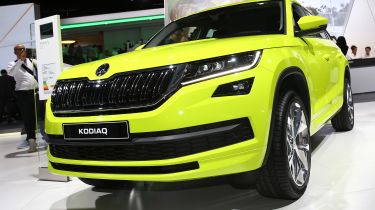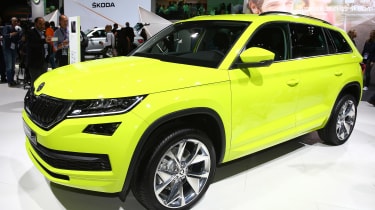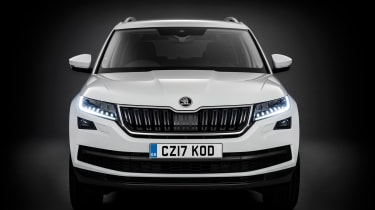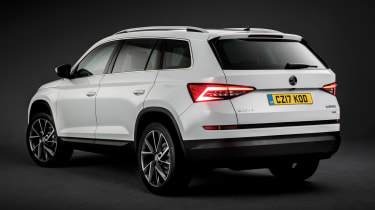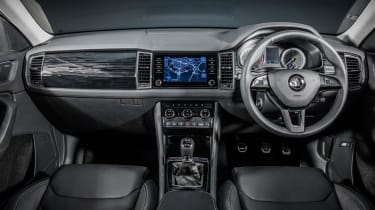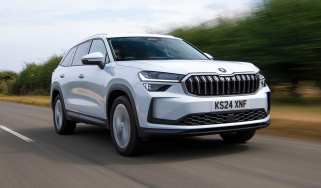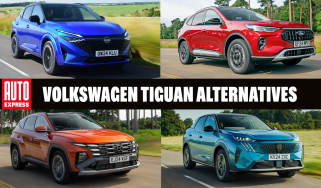New Skoda Kodiaq SUV: prices, specs and everything you need to know
The Skoda Kodiaq is available now in five or seven-seat guises with prices from £21,495. Get all the details here…
The Skoda Kodiaq was revealed at the 2016 Paris Motor Show and is on sale now priced from £21,495. The new Kodiaq is a large SUV that comes with five seats as standard but has a seven-seat option. It’s aiming to trump rivals primarily on list price and carrying capacity and it will also tap into the VW Group’s well-known engine line-up.
As well as the five units offered from launch, Auto Express has learned that a 240bhp performance diesel version is on the cards, while Sportline, Scout and Laurin & Klement variants will extend the trim level range. A high performance Kodiaq vRS model is said to be "under discussion".
The new model is 4,700mm long, 1,882mm wide and 1,676mm tall; those figures are a few millimetres shorter, wider and taller than the Hyundai Santa Fe but significantly, Skoda’s offering has a wheelbase that’s 91mm longer than its Korean rival’s, at 2,791mm. Indeed, the Kodiaq sits on the largest version of the VW Group’s MQB chassis technology to be used in a European-market car; only the forthcoming VW Tiguan XL will get as long a wheelbase.
The overall stance of the Kodiaq is stronger and more angular than we’ve seen before in the Yeti - although its wide grille and crisp headlights (influenced, as is the norm these days, by Czech crystal) are in keeping with the look of the latest Skoda Superb. The Yeti itself is due for replacement and a name change with the new Skoda Karoq set to take design cues from its Kodiaq big brother.
Despite the size of the vehicle, Skoda has made effective use of the MQB chassis construction to keep down the Kodiaq’s weight. The firm says that it weighs 1,452kg without a driver in front-wheel-drive petrol form, and that switching to four-wheel drive adds round 80kg to that total. Seven-seat versions will weigh a little more than that again, of course.
Skoda Kodiaq SUV: prices and trim levels
That Kodiaq starting price is £900 less than the entry-level Nissan X-Trail, and considerably cheaper than similarly sized models like the Santa Fe and Kia Sorento. It's also cheaper than the smaller, five-seat-only VW Tiguan.
The Skoda Kodiaq is offered in the UK with four trim levels and five engine options. That base price gets you a five-seat 'S' spec car fitted with 1.4-litre TSI turbo petrol engine with 123bhp and a six-speed manual gearbox. Standard kit includes LED daytime running lights, 17-inch alloy wheels, a touchscreen infotainment system with a DAB radio and Smartlink infotainment tech. Keyless go, front assist and a leather steering wheel are also thrown in.
You can step up to an SE spec Kodiaq for £22,495, gaining 18-inch alloys, tinted windows, cruise control and rear parking sensors. An upgraded eight-inch touchscreen, dual-zone climate control, auto lights and wipers and an auto-dim rear view mirror complete the upgrade. SE spec also allows you to go from five seats to seven for an extra £1,000.
SE-L Kodiaq models start from £28,595, with standard seven seats, an electric tailgate, 19-inch alloys, sat-nav and WiFi. LED headlights and heated front seats are also added. Top-spec Edition models (from £30.895) bring leather, chrome roof rails and kit such as wireless smartphone charging.
Additional engine options include a 148bhp 1.4 TSI petrol and a 178bhp 2.0-litre TSI petrol ( the latter is mated exclusively to a 7-speed DSG gearbox and four-wheel drive). A 2.0-litre diesel with 148bhp and 187bhp also features, with the latter also auto-only, while a 114bhp version will also debut at a later date.
Skoda Kodiaq SUV: engines and transmissions
The Skoda Kodiaq will be available at launch with a choice of two diesel engines and three petrols. The diesels are Skoda’s familiar 2.0-litre four-cylinder unit in two states of tune - 148bhp/340Nm and 187bhp/400Nm. The petrols are a 1.4-litre with 123bhp and 200Nm, a more powerful 1.4 that brings cylinder deactivation technology and offers 148bhp and 250Nm, and a 2.0 with 177bhp and 320Nm.
The range-topping diesel and petrol engines are available only with four-wheel drive and a seven-speed dual-clutch DSG gearbox. The more modest diesel and 1.4-litre units are DSG-only in front-wheel-drive trim, but can have that transmission or a six-speed manual when equipped with four-wheel drive.
The 148bhp 1.4 petrol gets either a six-speed DSG or a six-speed manual in four-wheel-drive versions, or just the DSG with front-drive. The only Kodiaq that’s available with the combination of front-wheel drive and a manual gearbox is the entry-level petrol, therefore; it doesn’t get any DSG option.
The cleanest and most efficient model will be the lower-powered diesel. This is likely to be in front-drive DSG trim; it emits just 131g/km of CO2 in this form, and 142g/km with four-wheel drive and a manual gearbox.
The more powerful diesel can reach 62mph from rest in 8.6 seconds; it emits 153g/km of CO2. The high-powered petrol, meanwhile, is the fastest of all in acceleration - with a 0-62mph time of 7.8 seconds - but its CO2 emissions of 171g/km mean it’s likely to be a niche choice in the UK.
Skoda has acknowledged that the seven-speed DSG transmission is rated at up to 600Nm; it’s likely that the VW Group’s twin-turbodiesel will appear in a high-performance version of the car, probably later in 2017.
The Kodiaq gets Driving Mode Select on its options list; it allows the driver to select different modes which alter the engine response, gearbox software, power steering and air-conditioning depending on the terrain and surfaces being traversed. Four-wheel-drive editions get an extra mode - Snow, which alters the behaviour of the anti-lock brakes and the transmission’s clutch to improve stability on slippery roads. Adaptive suspension will be an option - as will an off-road mode that includes hill descent control.
Skoda Kodiaq SUV: interior and boot space
Inside, the Kodiaq gives us Skoda’s sharpest-looking cabin yet. It’s clearly recognisable as a close relative of the Superb’s, but gets a more dynamic fascia design that includes two distinct areas ahead of the driver and passenger, narrowing down to a central display in the middle of the dash. The touch-screen is a 6.5in item as standard, but Skoda’s Bolero set-up, based around an 8.0-inch display, is available as an option. There’s also a phone box that incorporates inductive wireless charging for smartphones.
Skoda has a reputation for producing cars with large loadspaces for their class, and the Kodiaq looks set to continue the trend. In five-seat form, and using the second row’s ability to move forwards and backwards by up to 18cm (standard across the range), the car’s boot capacity can be as much as a hefty 720 litres - almost 140 litres up on the Santa Fe’s.
The gap between the two cars grow further when the seats lowered; the Kodiaq breaks through the 2,000-litre mark, at 2,065 litres, compared with the Hyundai’s 1,680 litres. Skoda has not released any technical information on seven-seat versions but it’s believed that the extra pair of seats will fold down flat into the boot floor to offer the same load bay as the five-seater.
The Kodiaq gets plenty of driver assistance systems, including Tow Assist, which takes over steering when reversing slowly, and surround-view cameras that give a top-down view of the car on the central screen during low-speed manoeuvres. City Emergency Braking, Adaptive Cruise Control and Lane Keep Assist (which works at speeds of up to 40mph) are also on the features list.
Click on to page two for more on the Kodiaq’s technology and development process…
Find a car with the experts
